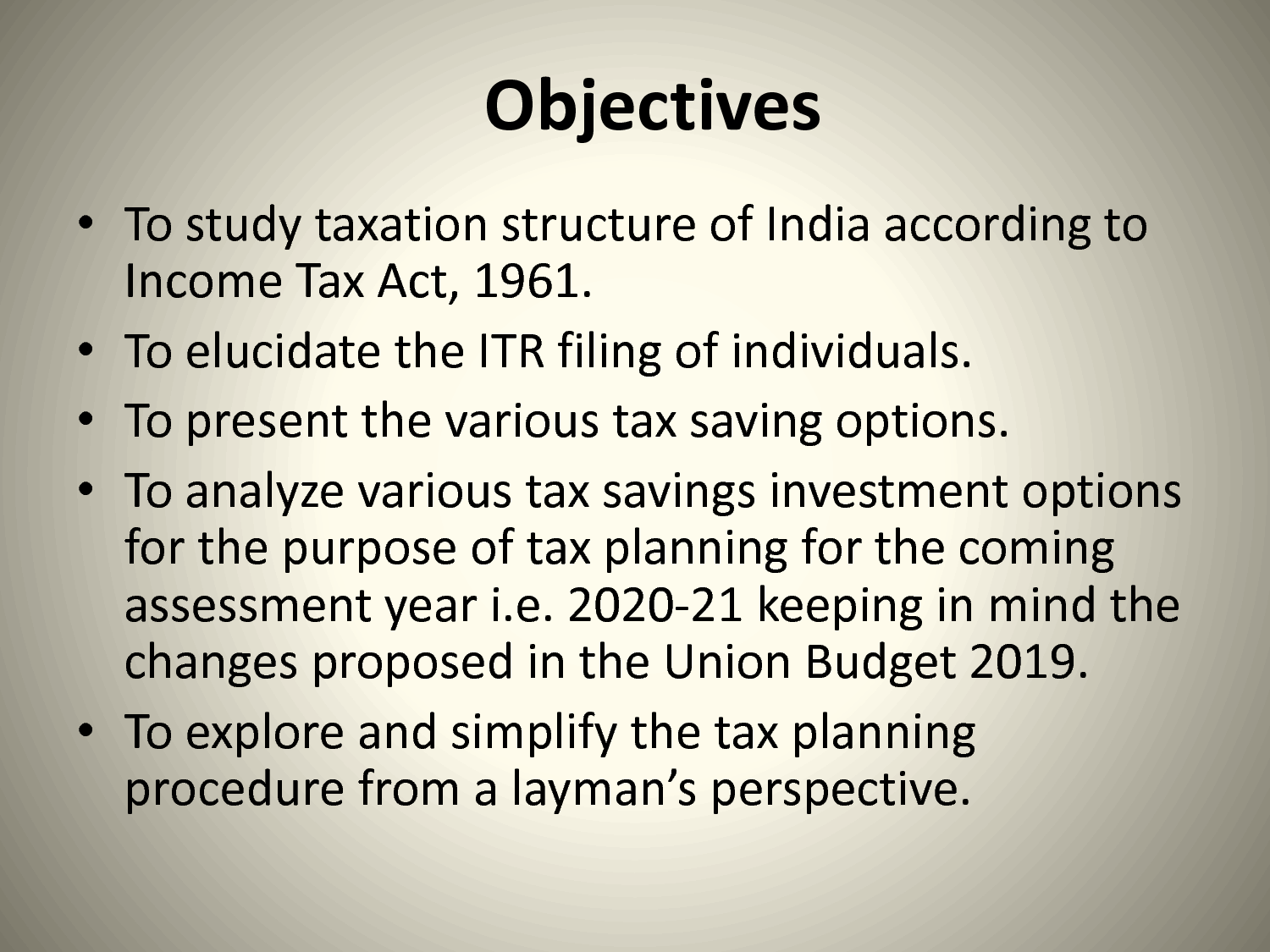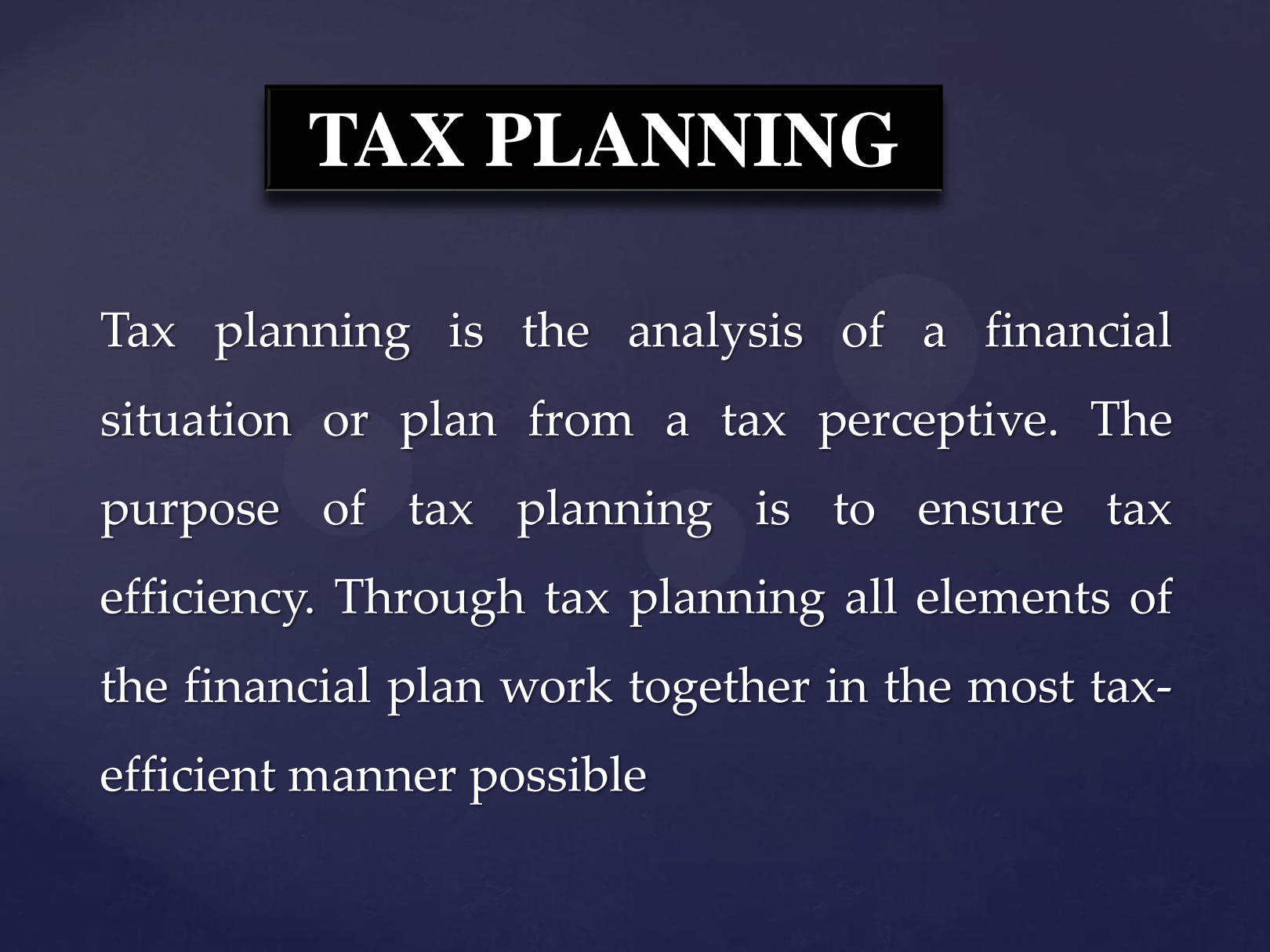

Finance
What Are Tax Planning Services?
Published: January 20, 2024
Discover the benefits of tax planning services and how they can help optimize your finances. Gain expert advice on maximizing tax savings and achieving financial goals.
(Many of the links in this article redirect to a specific reviewed product. Your purchase of these products through affiliate links helps to generate commission for LiveWell, at no extra cost. Learn more)
Table of Contents
Introduction
Tax planning services play a crucial role in managing the financial aspects of individuals and businesses. With a complex and ever-changing tax landscape, it is essential to have a solid tax strategy in place to optimize financial outcomes and minimize tax liabilities. Whether you’re an individual looking to maximize your tax refund or a business owner seeking to minimize your tax burden, tax planning services can provide the expertise and guidance needed to navigate the intricacies of tax laws.
At its core, tax planning involves analyzing financial situations and making strategic decisions to ensure compliance with tax laws while taking advantage of available deductions, credits, and exemptions. Effective tax planning takes into account various factors, including income, expenses, investments, and long-term financial goals. By carefully assessing these factors and implementing appropriate strategies, individuals and businesses can achieve significant savings and financial stability.
With the constant changes in tax regulations and the increasing complexity of the tax code, staying up-to-date and making informed decisions can be overwhelming. This is where tax planning services come into play. Experienced tax professionals have the knowledge and expertise to navigate the intricacies of tax laws and regulations, staying on top of changes and developments that may impact their clients’ financial situation.
Moreover, tax planning services can provide personalized guidance tailored to the specific needs and goals of each client. Whether you’re an individual looking to minimize your tax liability or a business owner seeking to optimize your tax structure, tax planning services can develop customized strategies to meet your unique requirements.
In the following sections, we will delve deeper into the definition, importance, objectives, strategies, benefits, and role of tax planning services providers. Additionally, we will explore the factors individuals and businesses should consider when choosing tax planning services that align with their specific needs and objectives.
Definition of Tax Planning Services
Tax planning services are professional financial services that focus on helping individuals and businesses optimize their tax situations by formulating strategies to minimize tax liabilities while remaining compliant with tax laws. These services are provided by tax professionals who possess in-depth knowledge of tax regulations and expertise in financial planning.
The main objective of tax planning services is to analyze the financial situation of individuals or businesses and develop customized strategies to legally reduce their tax burden. This involves evaluating income sources, investments, expenses, and deductions to identify potential opportunities for tax optimization.
Tax planning services encompass a range of activities, including tax preparation, tax forecasting, and tax compliance. Tax professionals work closely with their clients to understand their financial goals, identify areas where tax savings can be realized, and create a comprehensive tax plan that aligns with their objectives.
These services are not limited to a specific group of individuals or businesses, as tax planning can be beneficial for anyone with financial obligations and aspirations. From individuals managing their personal finances to small business owners, corporations, and high-net-worth individuals, tax planning services cater to a wide range of clients.
In addition to the technical aspects of tax planning, these services also involve educating clients about various tax incentives, deductions, and credits that they may be eligible for. By understanding the tax landscape and utilizing available tax strategies, individuals and businesses can minimize their tax liability and maximize their financial success.
It is important to note that tax planning services should always be conducted within the legal boundaries defined by the tax laws of the jurisdiction in which the taxpayer operates. Ethical tax planning involves making use of legitimate strategies and incentives provided by tax authorities to minimize tax liability, rather than engaging in illegal or fraudulent practices.
Overall, tax planning services provide individuals and businesses with expert guidance and customized strategies to optimize their tax situation and achieve their financial goals while remaining compliant with tax laws. By leveraging the expertise of tax professionals, clients can navigate the complexities of tax regulations and make informed decisions that result in significant tax savings.
Importance of Tax Planning Services
Tax planning services are of paramount importance for individuals and businesses alike. They offer numerous benefits and play a crucial role in financial management. Here are some key reasons why tax planning services are essential:
1. Minimizing Tax Liability:
One of the primary objectives of tax planning services is to reduce tax liabilities legally. By analyzing financial situations and making strategic decisions, tax professionals can identify opportunities for deductions, credits, and exemptions that can lower the amount of tax owed. This can result in significant savings, allowing individuals and businesses to allocate their resources to other financial priorities.
2. Maximizing Tax Refunds:
For individuals, tax planning services can help maximize tax refunds by identifying all eligible deductions and tax credits. By ensuring that all potential deductions and credits are claimed, individuals can receive the maximum refund they are entitled to. This can provide additional funds that can be used for savings, investments, or other financial goals.
3. Achieving Financial Goals:
Tax planning services can align tax strategies with long-term financial goals. Whether it’s saving for retirement, purchasing a home, starting a business, or funding education, tax planning ensures that financial decisions are made in a tax-efficient manner. By optimizing tax strategies, individuals and businesses can accelerate their progress towards their financial objectives.
4. Compliance with Tax Laws:
Staying compliant with tax laws can be challenging due to frequent changes and complexities. Tax planning services help individuals and businesses navigate the ever-evolving tax landscape and remain in compliance with the applicable tax regulations. This reduces the risk of penalties, fines, and other legal consequences associated with non-compliance.
5. Strategic Business Decisions:
For businesses, tax planning services play a vital role in making strategic decisions. Tax professionals can assess the tax implications of various business activities such as investments, expansion, acquisitions, and restructuring. This enables businesses to optimize their tax structure and make informed decisions that support growth and profitability.
6. Planning for Life Events:
Life events such as marriage, divorce, birth, death, job changes, and retirement can have significant tax implications. Tax planning services help individuals navigate these transitions and make informed tax decisions that are best suited for their circumstances. By considering the tax implications of major life events, individuals can make proactive choices to minimize tax liabilities.
In summary, tax planning services are essential for minimizing tax liabilities, maximizing tax refunds, achieving financial goals, ensuring compliance with tax laws, making strategic business decisions, and navigating life events. By leveraging the expertise of tax professionals, individuals and businesses can optimize their tax situations and secure their financial future.
Objectives of Tax Planning Services
Tax planning services have several objectives that revolve around optimizing tax efficiency, minimizing tax liabilities, and ensuring compliance with tax laws. The primary goals of tax planning services include:
1. Minimizing Tax Liabilities:
The primary objective of tax planning services is to minimize tax liabilities legally. Tax professionals analyze the financial situation of individuals or businesses and identify tax-saving opportunities. By leveraging available tax deductions, credits, exemptions, and incentives, tax planning services aim to reduce the overall tax burden, allowing clients to retain a larger portion of their earnings.
2. Maximizing Tax Efficiency:
Tax planning services strive to maximize tax efficiency by creating strategies that optimize the timing and categorization of income and expenses. By strategically managing cash flow, capital gains, losses, and deductions, tax professionals can help clients minimize their tax liability and maximize their after-tax income. This enables individuals and businesses to make the most of their financial resources.
3. Ensuring Compliance:
Compliance with tax laws is a critical objective of tax planning services. Tax professionals stay up-to-date with the latest tax regulations and ensure that clients’ tax plans are in full compliance with legal requirements. By adhering to tax laws and regulations, tax planning services help clients avoid penalties, fines, and other potential consequences of non-compliance.
4. Optimizing Business Structure:
For businesses, tax planning services aim to optimize their tax structure. This involves evaluating the various legal entities, such as sole proprietorships, partnerships, corporations, and Limited Liability Companies (LLCs), to determine the most tax-efficient structure. By considering factors such as liability protection, ease of operations, and tax implications, tax planning services help businesses choose the optimal structure that minimizes tax liabilities and maximizes financial benefits.
5. Planning for Major Financial Decisions:
Tax planning services assist clients in making tax-smart decisions regarding major financial events. Whether it’s buying or selling a property, starting or expanding a business, or planning for retirement, tax professionals analyze the tax implications of these decisions to ensure that clients make informed choices. By considering the tax consequences in advance, tax planning services help clients avoid unexpected tax liabilities and optimize their financial outcomes.
6. Maximizing Deductions and Credits:
Tax planning services focus on identifying and maximizing eligible tax deductions and credits. By exploring all available deductions and credits, such as those related to education, homeownership, medical expenses, and business expenses, tax professionals help clients reduce their taxable income. This results in lower tax liabilities and potentially larger tax refunds, allowing individuals and businesses to keep more of their hard-earned money.
Overall, the objectives of tax planning services are to minimize tax liabilities, maximize tax efficiency, ensure compliance with tax laws, optimize business structures, plan for major financial decisions, and maximize eligible deductions and credits. By achieving these objectives, tax planning services contribute to financial stability, growth, and long-term success for individuals and businesses alike.
Strategies for Tax Planning Services
Tax planning services employ various strategies to help individuals and businesses optimize their tax situations and minimize tax liabilities. These strategies are designed to take advantage of available deductions, credits, exemptions, and incentives while remaining compliant with tax laws. Here are some common strategies used in tax planning services:
1. Income Shifting:
Income shifting involves redistributing income among family members or entities to take advantage of lower tax brackets or reduce overall tax liabilities. This strategy can be used to allocate income to individuals with lower income levels, potentially resulting in reduced taxes for the household.
2. Timing of Income and Expenses:
The timing of income and expenses can impact tax liabilities. Tax planning services help clients strategically time the recognition of income and the payment of expenses to optimize their tax situation. By deferring income or accelerating expenses into the following tax year, individuals and businesses can potentially lower their taxable income and reduce their tax liability.
3. Deduction Optimization:
Tax planning services evaluate clients’ expenses and identify deductions they are eligible for. This includes deductions for business expenses, medical expenses, educational expenses, mortgage interest, and charitable contributions. By maximizing these deductions, tax professionals help clients reduce their taxable income, leading to lower tax liabilities.
4. Capital Gains Planning:
For individuals and businesses with capital investments, tax planning services can involve strategies to manage capital gains and losses efficiently. By strategically selling assets and offsetting gains with losses, tax professionals help clients minimize their capital gains tax liabilities. They may also recommend holding assets for longer periods to qualify for lower long-term capital gains rates.
5. Retirement Contributions:
Tax planning services focus on maximizing contributions to retirement accounts such as Individual Retirement Accounts (IRAs) and 401(k) plans. By contributing to these accounts, individuals can potentially reduce their taxable income and defer taxes on investment earnings. Additionally, tax planning services help clients understand the tax implications of different retirement account options and determine the most advantageous approach for their financial goals.
6. Entity Structure Optimization:
For businesses, tax planning services consider the optimal entity structure based on factors such as liability protection, operational considerations, and tax implications. This may involve selecting between sole proprietorships, partnerships, corporations, or Limited Liability Companies (LLCs) to minimize tax liabilities and maximize tax benefits, such as pass-through deductions.
7. Tax Credits:
Tax planning services explore tax credits available to individuals and businesses and maximize their utilization. This includes credits related to education, energy-efficient investments, research and development activities, and low-income housing, among others. Utilizing these credits can directly reduce tax liabilities by offsetting taxes owed.
These are just a few examples of the strategies employed by tax planning services. The specific strategies implemented will vary depending on individual circumstances, financial goals, and the ever-changing tax laws. By leveraging these strategies, tax planning services provide clients with the tools and guidance needed to optimize their tax situations and achieve their financial objectives.
Benefits of Tax Planning Services
Tax planning services offer numerous benefits for both individuals and businesses. These services provide expert guidance and strategies to optimize tax situations and minimize tax liabilities. Here are some key benefits of utilizing tax planning services:
1. Maximizing Tax Savings:
Tax planning services are designed to help individuals and businesses identify and utilize all available deductions, credits, exemptions, and incentives. By implementing effective tax strategies, clients can legally minimize their tax liabilities and maximize their savings. This can result in significant financial advantages, allowing individuals and businesses to retain more of their hard-earned money.
2. Achieving Financial Goals:
Effective tax planning aligns tax strategies with long-term financial goals. Whether it’s saving for retirement, funding education, starting a business, or purchasing a home, tax planning services help individuals and businesses make informed decisions that optimize their tax situation and support their financial objectives. By considering the tax implications of financial choices, clients can accelerate their progress towards their goals.
3. Reducing Tax Stress and Errors:
Tax planning services alleviate the stress and burden associated with managing tax obligations. Tax professionals have the knowledge and expertise to navigate the complexities of the tax code, ensuring that clients remain compliant with tax laws. This reduces the risk of errors on tax returns, audit triggers, and potential penalties, providing peace of mind and allowing individuals and businesses to focus on their core activities.
4. Staying Up-to-Date with Tax Laws:
Tax laws and regulations are constantly changing, making it challenging for individuals and businesses to keep track of the latest developments. Tax planning services stay abreast of these changes and have a deep understanding of the evolving tax landscape. By relying on tax professionals, clients can ensure that their tax plans are current and compliant with the most recent tax laws, maximizing their tax savings and minimizing potential risks.
5. Proactive Tax Management:
Tax planning services take a proactive approach to tax management. Rather than waiting until tax season to address tax obligations, tax professionals work throughout the year to develop and implement strategies that optimize tax situations. This proactive approach enables clients to make timely financial decisions and take advantage of tax-saving opportunities as they arise.
6. Personalized Guidance:
Tax planning services provide personalized guidance tailored to the unique financial situations of clients. Tax professionals take the time to understand clients’ financial goals, circumstances, and objectives, and develop customized tax strategies to meet their specific needs. This ensures that clients receive individualized advice and recommendations that align with their financial aspirations.
7. Expertise and Knowledge:
Tax planning services offer the expertise and knowledge of tax professionals who specialize in tax laws and regulations. These professionals continuously update their knowledge to stay abreast of changes in tax legislation. By leveraging their expertise, clients benefit from accurate and comprehensive tax planning services, optimizing their tax situations and minimizing risks associated with non-compliance.
In summary, tax planning services provide a range of benefits, including maximized tax savings, achievement of financial goals, reduced tax stress and errors, staying up-to-date with tax laws, proactive tax management, personalized guidance, and access to expert knowledge. By leveraging these benefits, individuals and businesses can navigate the complexities of the tax landscape, optimize their tax situations, and achieve long-term financial success.
Role of Tax Planning Services Providers
Tax planning services providers play a pivotal role in helping individuals and businesses optimize their tax situations and minimize tax liabilities. These professionals possess in-depth knowledge of tax laws and regulations and provide expert guidance and strategies to navigate the complexities of the tax landscape. The role of tax planning services providers can be summarized as follows:
1. Tax Expertise:
Tax planning services providers have a deep understanding of tax laws and regulations. They stay up-to-date with the latest changes and developments in tax legislation to ensure that their clients’ tax plans are current and compliant. Their expertise allows them to analyze complex financial situations, identify tax-saving opportunities, and develop tailored tax strategies to optimize clients’ tax situations.
2. Financial Analysis:
Tax planning services providers thoroughly analyze the financial situation of individuals and businesses. They assess income sources, investments, expenses, deductions, and credits to gain a comprehensive understanding of their clients’ financial picture. This analysis enables them to develop effective tax plans tailored to their clients’ specific needs and financial goals.
3. Customized Tax Strategies:
Based on the financial analysis, tax planning services providers develop customized tax strategies for individuals and businesses. These strategies are designed to minimize tax liabilities while remaining compliant with tax laws. They leverage available deductions, credits, exemptions, and incentives to optimize clients’ tax situations and maximize their tax savings.
4. Proactive Tax Planning:
Tax planning services providers take a proactive approach to tax management. They work throughout the year, not just during tax season, to develop and implement strategies that optimize clients’ tax situations. By staying ahead of potential tax issues and changes in tax laws, providers can help clients make informed financial decisions and take advantage of tax-saving opportunities as they arise.
5. Tax Compliance:
Tax planning services providers ensure that their clients remain in compliance with tax laws and regulations. They assist in the preparation and filing of tax returns, ensuring accurate and timely submission. By helping clients meet their tax obligations, providers help minimize the risk of penalties, fines, and other potential consequences associated with non-compliance.
6. Education and Guidance:
Tax planning services providers educate and guide their clients on various tax strategies, deductions, and credits that may be beneficial to their financial situation. They explain complex tax concepts in a clear and understandable manner, empowering clients to make informed decisions. Providers also keep their clients informed about any tax law changes or updates that may impact their tax planning strategies.
7. Tax Audit Support:
In the event of a tax audit or examination, tax planning services providers offer support to their clients. They can represent clients and help navigate the audit process, responding to inquiries from tax authorities and providing necessary documentation. This support provides peace of mind to clients, knowing that they have professional assistance in handling potential tax disputes.
Overall, tax planning services providers play a crucial role in optimizing clients’ tax situations. They bring expertise, financial analysis, customized strategies, proactive planning, compliance assistance, education, guidance, and audit support to help individuals and businesses minimize tax liabilities and maximize tax savings. By leveraging their knowledge and skills, tax planning services providers contribute to their clients’ financial stability, growth, and long-term success.
Factors to Consider When Choosing Tax Planning Services
Choosing the right tax planning services is crucial for individuals and businesses looking to optimize their tax situations and minimize tax liabilities. It is important to consider several factors when selecting tax planning services to ensure that they align with your specific needs and objectives. Here are key factors to consider:
1. Expertise and Qualifications:
Consider the expertise and qualifications of the tax planning services provider. Look for professionals with relevant certifications, such as Certified Public Accountants (CPAs), Enrolled Agents (EAs), or tax attorneys. Assess their experience and knowledge in tax laws, regulations, and financial planning. A qualified and experienced tax professional will have the necessary expertise to navigate complex tax situations effectively.
2. Range of Services:
Determine the range of services offered by the tax planning services provider. Some providers offer comprehensive tax planning, preparation, and compliance services, while others may specialize in specific areas, such as business taxation or international tax planning. Assess your needs and ensure that the provider offers the specific services relevant to your situation.
3. Industry Knowledge:
If you have specific industry-related tax considerations, such as real estate, healthcare, or technology, consider whether the tax planning services provider has expertise in your industry. Industry-specific knowledge allows the provider to understand the unique tax implications and opportunities relevant to your sector, enabling them to develop tailored strategies and recommendations.
4. Reputation and Track Record:
Research the reputation and track record of the tax planning services provider. Look for testimonials, reviews, and client references to gauge their reliability, professionalism, and effectiveness in delivering results. A provider with a strong track record and positive client feedback is more likely to provide quality service and meet your expectations.
5. Clientele and Specialization:
Consider the clientele and specialization of the tax planning services provider. Some providers focus on serving specific types of clients, such as individuals, small businesses, or multinational corporations. Assess whether their client base aligns with your needs and objectives. Additionally, consider if the provider specializes in areas that are relevant to your tax planning goals, such as estate planning, tax credits, or retirement planning.
6. Communication and Availability:
Effective communication is crucial when working with tax planning services providers. Ensure that the provider is responsive, accessible, and willing to address your questions and concerns. Clear and timely communication is essential to ensure that you understand the tax strategies and recommendations provided, enabling you to make well-informed decisions.
7. Fee Structure:
Consider the fee structure of the tax planning services provider. Different providers may have different billing models, such as hourly rates, project-based fees, or retainer fees. Ensure that you have a clear understanding of the fees involved and any potential additional charges. It may be beneficial to obtain quotes from multiple providers to compare costs and evaluate the value offered for the price.
8. Trust and Compatibility:
Establishing trust and a good working relationship with your tax planning services provider is essential. Consider whether you feel comfortable sharing sensitive financial information with the provider and if they demonstrate integrity and professionalism. Choose a provider with whom you have good rapport and feel confident in their ability to handle your tax matters effectively.
By considering these factors when selecting tax planning services, you can choose a provider that aligns with your specific needs and objectives. A well-qualified and reputable tax planning services provider can offer expert guidance, develop customized strategies, and help optimize your tax situation to achieve your financial goals.
Conclusion
Tax planning services are vital for individuals and businesses seeking to optimize their tax situations and minimize tax liabilities. With a complex and ever-changing tax landscape, tax planning services provide expert guidance, strategies, and personalized advice to navigate the intricacies of tax laws. By leveraging the expertise of tax professionals, individuals and businesses can achieve various benefits, including maximizing tax savings, achieving financial goals, ensuring compliance, and making informed financial decisions.
The role of tax planning services providers entails analyzing financial situations, developing customized tax strategies, and staying up-to-date with tax laws. These professionals offer expertise, financial analysis, proactive planning, compliance assistance, education, guidance, and audit support to help clients minimize tax liabilities and optimize tax savings. Choosing the right tax planning services requires considering factors such as expertise, range of services, industry knowledge, reputation, clientele, communication, and fee structure.
In conclusion, tax planning services are indispensable for individuals and businesses looking to achieve financial stability, growth, and long-term success. These services provide the knowledge, strategies, and support needed to make informed tax decisions, ensure compliance, maximize tax savings, and achieve financial goals. By leveraging the expertise of tax planning services providers, clients can navigate the complexities of the tax landscape with confidence, optimizing their tax situations and securing their financial future.














